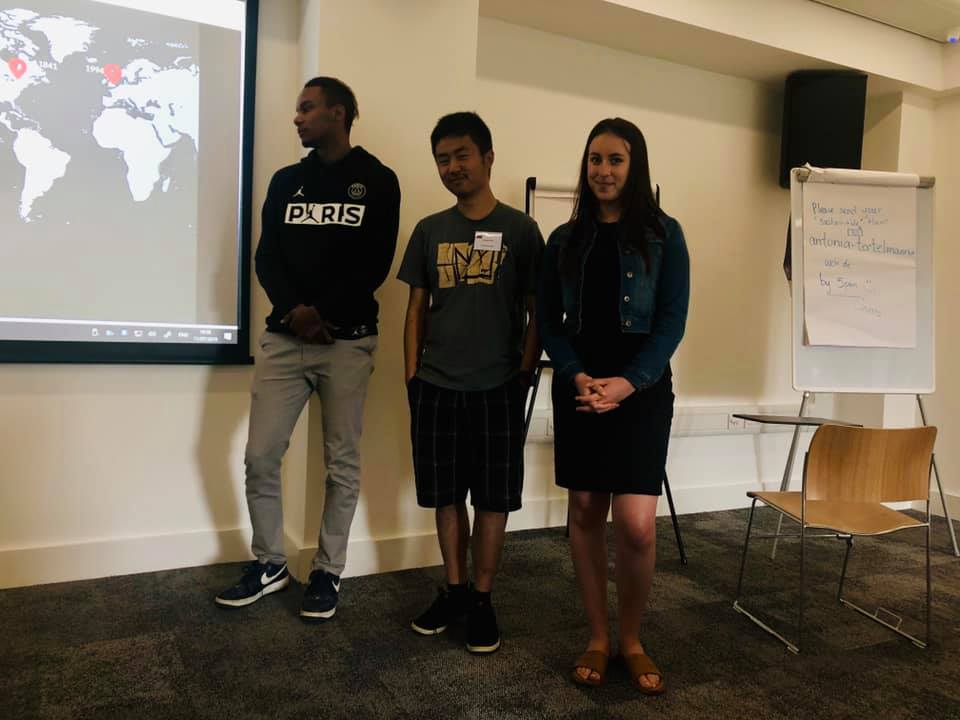by Tatiana Bruni, Durham University & University College Utrecht
On Day 3 of the forum, in the session dedicated to educational models, the delegates of Dartmouth (students Sydney Kamen and Brandon Zhou, and faculty Leah Torrey) illustrated two models of experiential learning offered at their college through the support of the Center for Social Impact at Dartmouth (DCSI).
The first of the two models is called Social Impact Practicums (SIPs). SIPs are project-based experiential learning opportunities connecting undergraduate courses with community needs identified by nonprofit organizations in the wide area. A very interesting feature of SIPs, which are integrated in an average of 30 courses per year, is that they run across over 20 disciplines. DCSI is tasked with connecting with organizations and stakeholders in the region to identify demands and challenges the communities would like to be addressed, creating thus a databank of community-driven problems. Those problems are evaluated and, where possible, passed on to faculty who either integrate the Social Impact Practicum in existing or new courses, in which case teachers receive money for their time investment. As a teacher myself, I think this is a real and important incentive, but also a recognition for the engagement of faculty in innovating learning practices. SIPs aim on the one hand at delivering high-impact solutions to societal challenges, and on the other hand at allowing students to practice and apply classroom learning to address those real-world challenges. This was enthusiastically illustrated by Sydney Kamen, who shared with us her experience with three SIPs. These were very different types of courses, where the component of outreach varied greatly. One course focused on generating collaborative projects and community service that addressed the health care and development needs of a region in South America. Critical reflection about the ethical aspects of ‘voluntourism’ was a key feature of this course. The outcomes of the SIP in the second course was mapping access to primary health services for disabled communities. The third course included a diplomacy and leadership workshop, and participation in a Model Arctic Council focused on issues of Arctic climate, health, and sustainability. What Kamen appreciated most, is that SIPs are real-world projects with real-world impact.
Brandon Zhou presented the second educational model based on experiential learning. The first course, “Design Thinking”, was centered around group work and students experimented with creativity in problem-solving. This course, which uses design thinking as pedagogic tool, taught him the cognitive strategies and methodologies that form the basis of creative design practice: he talked about “welcoming risk taking”. The second course was called ‘Senior Design Challenge’. Using human-centered design, students learn to create something that makes a difference in the community by collaborating in multidisciplinary teams, learning thus how to collaborate effectively. The final project for this course entailed addressing a human-centered problem using design thinking. The idea for their project was sparkled by their interest in street art and graffiti: in many places it is forbidden and thus illegal to paint on walls and other architecture in the city. However, quite some people are interested in and enjoy graffiti. They designed an app for smartphones that make us of augmented reality: when people are in front of a wall, they can open up the virtual piece of street art that artists had created for that wall. Zhou listed three learning elements of these courses: 1) keeping a design notebook proved very valuable in reflecting on your ideas and the process; 2) re-imagining classroom interactions into a more collaborative space; 3) embracing project-based learning.
The delegates of Dartmouth College made me dream: their college seem to have vast resources to invest in small scale, student-centered innovative form of teaching and learning that are designed to foster engagement in the wide community in an ethical and impactful way. The range of different SIPs is impressive, and the application of design thinking to solve human-centered problems is fascinating. For faculty and staff, it is surely quite a huge effort in terms of time and energy to, on the one hand, design the courses and on the other hand, to link them to societal partners and their demands. I hope to be able to bring back their ideas and experiences to my college, which is much smaller, but which shares with Dartmouth the Liberal Arts and Science educational philosophy.

